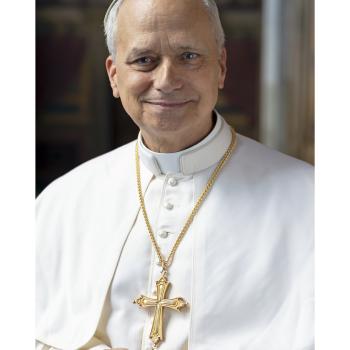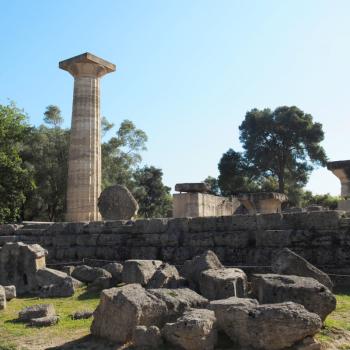Editor's Note: Below is a "Monday Sermon," from our series of sermons at the Patheos Preachers Portal that pastors can enjoy and learn from. It is our hope that this particular series from Daniel Harrell, which preaches through the Church Fathers, will encourage pastors, show them a way of approaching theological education from the pulpit, and refresh their theological memories. See Reverend Harrell's columnist page for more information.
 Whenever I get to sit with a small group from my church to talk theology, invariably a question surfaces regarding that ever-thorny conundrum: predestination and free will. The dilemma isn't merely theological. Philosophers wonder about it under the guise of determinism versus human independence; as do psychologists in their debates over nature versus nurture as well as biologists when deliberating the impact of genes versus the environment. Anyone who regards fate or its cousins as a potential force compelling and controlling human life has wrestled with this puzzle. For Christians however, the predestination predicament takes on deeper hues. Rather than impersonal fate, inherent traits, or genetic mutations, Christians regard an intimately personal and loving God as the force behind any predetermined script human behavior would follow.
Whenever I get to sit with a small group from my church to talk theology, invariably a question surfaces regarding that ever-thorny conundrum: predestination and free will. The dilemma isn't merely theological. Philosophers wonder about it under the guise of determinism versus human independence; as do psychologists in their debates over nature versus nurture as well as biologists when deliberating the impact of genes versus the environment. Anyone who regards fate or its cousins as a potential force compelling and controlling human life has wrestled with this puzzle. For Christians however, the predestination predicament takes on deeper hues. Rather than impersonal fate, inherent traits, or genetic mutations, Christians regard an intimately personal and loving God as the force behind any predetermined script human behavior would follow.
Of course any discussion of predestination mandates reference to the 16th-century Protestant Reformer, John Calvin. Reputedly a quiet and sensitive man, though one with immovable resolve, Calvin's impact on Protestantism has been gigantic.
Born in 1509 in the French province of Picardy, Calvin was initially intended for the priesthood. But after demonstrating early in life a keen ability for scholarly debate, his father insisted he redirect his aspirations toward law school. Honoring his father's wishes, Calvin became a successful lawyer. However upon his father's death, Calvin, always the industrious student, took up Hebrew and Patristics (the study of church fathers). In the course of these studies, he became acquainted with the teachings of Martin Luther, which eventually led, in 1533, to a dramatic conversion experience that inspired him toward a passion for purity and reform in the church.
"God subdued and brought my heart to docility," Calvin wrote. "It was more hardened . . . than was to be expected in such a young man." His conversion led to his break with Catholicism. Retreating to Basle, Switzerland, Calvin composed—at precocious age of 27—the first edition of his Institutes of the Christian Religion. Perhaps even more so than Martin Luther, John Calvin wove the patterns of thought that would dominate not only Western theology but culture itself throughout the modern period.
In Geneva, Switzerland, a rebellious citizenry overthrew the ruling House of Savoy in the late 1520s. Speaking French rather than German, the Genevans had been late in coming to Luther's fiery Protestantism. The Protestant governor of Bern, Switzerland's capital, determined to see Protestantism spread throughout the country, sent reformers into Geneva in 1533 and successfully converted it within two years. Calvin was invited to Geneva to be the architect for the new Reformed church. His initial efforts not merely reformed but radically transformed the Genevan church, changing its governance from top to bottom and tying it tightly to the social and civil life. Calvin wanted Geneva to be like the kingdom of God on earth. He is reputed to have been the first major political thinker to model civic society in accordance with biblical standards. Regrettably, his plan to catechize the entire town and require coherence to a stern moral code met with the same enthusiasm of the ancient Israelites when Moses rolled out Leviticus.
Perhaps Calvin did get a bit carried way. He persuaded the town council to adopt a confession of faith to which everyone was compelled to subscribe. Failure to do so got you excommunicated from church and disciplined with a severity that even surpassed Levitical law. According to the Town Council's minute book, a man smiled during a baptism and was thrown in jail for three days. Another was (deservedly) imprisoned for dozing off during a sermon. Reportedly, one person who publicly protested against predestination was flogged and banished. A book printer who had railed at Calvin had his tongue perforated with a red-hot iron. Another reportedly got the rack for calling Calvin a hypocrite. Capital punishment through hanging or burning was carried out on some of the more recalcitrant resisters. Eventually, the people had enough. It was as if they had tossed out one tyrannical religious regime only to have it replaced by an identical twin. Calvin's reforms were labeled a new form of papacy: same oppressiveness, different oppressor. Calvin got run out of town.





